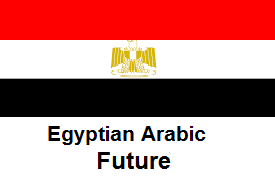Language/Egyptian-arabic/Grammar/Future-Tense
In Egyptian Arabic, the future tense is used to talk about actions or events that will take place in the future. This tense is formed by using a specific set of auxiliary verbs and inflections, and it can also be modified with adverbs of time to indicate when the future event will occur. In this lesson, we will go over the basics of how to form and use the future tense in Egyptian Arabic.
Once you've mastered this lesson, take a look at these related pages: Egyptian-arabic Grammar, Adjectives, Genitive Case & Use "بقدر" (can).
Forming the Future Tense[edit | edit source]
To form the future tense in Egyptian Arabic, you will need to use one of the following auxiliary verbs: "سوف" (souff), "سأ" (sa'a), or "أنا" (ana). These verbs are used to indicate that an action or event will take place in the future. After choosing one of the auxiliary verbs, you will need to add the appropriate inflection to match the subject of your sentence.
Examples[edit | edit source]
- I will eat: "أنا سأأكل" (ana sa'akul)
- He will drink: "هو سوف يشرب" (hou souff yishrab)
- They will dance: "هم سوف يرقصون" (hum souff yerqassoun)
Example : Verb to Speak[edit | edit source]
Verb in the present but change the beginning (ba) for (Ha) (---ه )
| TO SPEAK | بكلّم | Negative form |
|---|---|---|
| I WILL SPEAK (M) | انا هتكلّم | انا مش هتكلّم |
| YOU WILL SPEAK (M) | انت هتتكلّم | انت مش هتتكلّم |
| YOU WILL SPEAK (F) | انتي هتتكلّمي | انتي مش هتتكلّمي |
| HE WILL SPEAK | هو هيتكلّم | هو مش هيتكلّم |
| SHE WILL SPEAK | هي هتتكلّمي | هي مش هتتكلّمي |
| WE WILL SPEAK | احنا هنتكلّم | احنا مش هنتكلّم |
| YOU WILL SPEAK | انتو هتتكلّموا | انتو مش هتتكلّموا |
| THEY WILL SPEAK | هم هيتكلّموا | هم مش هيتكلّموا |
Using Adverbs of Time[edit | edit source]
Adverbs of time can be used to modify the future tense and indicate when the future event will take place. For example:
- Tomorrow: "غدا" (ghada)
- Next week: "الأسبوع القادم" (al-asbuye al-kadim)
- In two years: "بعد عامين" (baad 3aameen)
Examples:[edit | edit source]
- I will eat tomorrow: "أنا سأأكل غدا" (ana sa'akul ghada)
- They will dance next week: "هم سوف يرقصون الأسبوع القادم" (hum souff yerqassoun al-asbuye al-kadim)
- He will drink in two years: "هو سوف يشرب بعد عامين" (hou souff yishrab baad 3aameen)
Conclusion[edit | edit source]
The future tense in Egyptian Arabic is a valuable tool for expressing future actions and events. By using the appropriate auxiliary verbs and inflections, and modifying the tense with adverbs of time, you can communicate clearly and effectively in the language. Practice using the future tense in context, and you will soon become confident and proficient in this aspect of Egyptian Arabic.
Other Lessons[edit | edit source]
- Past Tense
- Conditional Mood
- Present continuous
- Phrases for everyday life
- Plurals
- Negation
- How to use the modal verb Must
- Verbs to speak
- How to Use Be
- Adjectives

